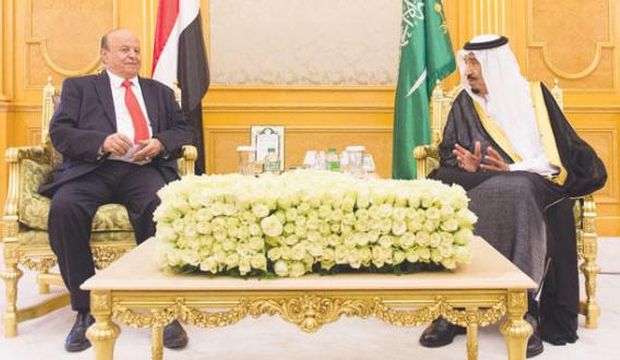
Saudi Arabia’s King Salman Bin Abdulaziz (R) meets with Yemen’s President Abd Rabbuh Mansur Hadi at the Al-Salam Palace in Jeddah, Saudi Arabia, on October 5, 2015. (Saudi Press Agency)
Taiz, Jeddah and Riyadh, Asharq Al-Awsat—Forces from the Saudi-led coalition, Yemeni government loyalists, and the Yemeni army are readying for an assault on the Houthis and their allies in Yemen’s southwestern Taiz province, which they hope will help them recapture the area from the rebels, a high-ranking Yemeni military source said.
Speaking to Asharq Al-Awsat, Maj. Gen. Ahmed Al-Seif said the Joint Forces—which comprise coalition, government loyalist, and Yemeni army forces—will attack Houthi-controlled areas in the southwestern province via three positions: the Al-Dalea and Ibb provinces to the northeast, and the Perim (Mayyun) Island in the Bab El-Mandeb strait to the southwest.
“The operation will be carried out quickly and will aim to bewilder enemy forces before [we] liberate the [area] from remaining [Houthi] pockets,” Seif said.
Meanwhile, a source from the volunteer government loyalists, known as the Popular Resistance, told Asharq Al-Awsat the Joint Forces have taken over 700 Houthi and allied fighters hostage in Taiz province so far, adding that some 100 had been killed in fighting with the Joint Forces during the last two days alone.
Coalition warplanes have intensified their air raids over the province in recent days, targeting Houthi weapons depots thought to contain Iranian-made rockets.
This comes as the Joint Forces recaptured the strategic Bab El-Mandeb strait last Thursday, another important victory over the Houthis in the country’s southern region. The Joint Forces have now liberated most of southern Yemen, including the port city of Aden, where the exiled Yemeni government and President Abd Rabbuh Mansur Hadi have now returned.
Taiz remains however one of the Houthis’ last remaining strongholds in southern Yemen, with most of the rebels’ forces now positioned in the capital Sana’a, the central Ma’rib province, and the Houthis’ traditional northern stronghold Saada province.
This also comes as the Houthis are beginning to lose ground in Ma’rib, where most of the fighting has shifted since August after southern regions of the country were liberated. On Sunday Ma’rib governor Sultan Al-Arada told Asharq Al-Awsat that dozens of Houthi and allied fighters were contacting the Yemeni army either to surrender or secure safe passage out of the province.
Meanwhile, on Monday Saudi Arabia’s King Salman Bin Abdulaziz met with Yemen’s internationally recognized President Abd Rabbuh Mansur Hadi at the Al-Salam Palace in the Saudi city of Jeddah.
King Salman said Saudi Arabia would continue to support the Yemeni government and its people in their fight against the Houthis, who took over the capital Sana’a last September and launched a coup against Hadi and the government the following February after Houthi and allied forces spread to other areas of the country.
Hadi, who fled to Saudi Arabia in March after a Houthi-imposed house arrest, thanked the Kingdom for its efforts in leading the anti-Houthi coalition, which began airstrikes against the rebels in March after Hadi requested Riyadh’s military intervention in Yemen.
The Houthis have gained support from forces in Yemen still loyal to ex-president Ali Abdullah Saleh, who was ousted in 2012 after mass protests against his more-than-three-decade rule. Iran has also supported the Shi’ite Houthis, with sources telling Asharq Al-Awsat in recent months that Iranian military advisers are present in Sana’a. Iranian-marked weapons and equipment have also been found at various positions vacated by the rebels.
Yemen officially severed ties with Iran last Friday, due to what Foreign Minister Riyadh Yassin called “a series of violations Tehran committed inside Yemeni territory.”
He told Asharq Al-Awsat the “violations” included Iran “stirring up sedition and unrest, smuggling weapons,” and supporting the Houthi coup against the government.
Yemen has now recalled its ambassador in Tehran and the Yemeni embassy has officially closed, with the country’s flag lowered from the front of the building.
Yassin told Asharq Al-Awsat via telephone on Monday that procedures are now under way to help all embassy staff and Yemeni officials leave Iran as soon as possible.
The foreign minister also said he had contacted his Turkish counterpart Ahmet Davutoğlu on Sunday, asking him to put more pressure on Tehran and to “safeguard Yemeni interests in Iran.”
